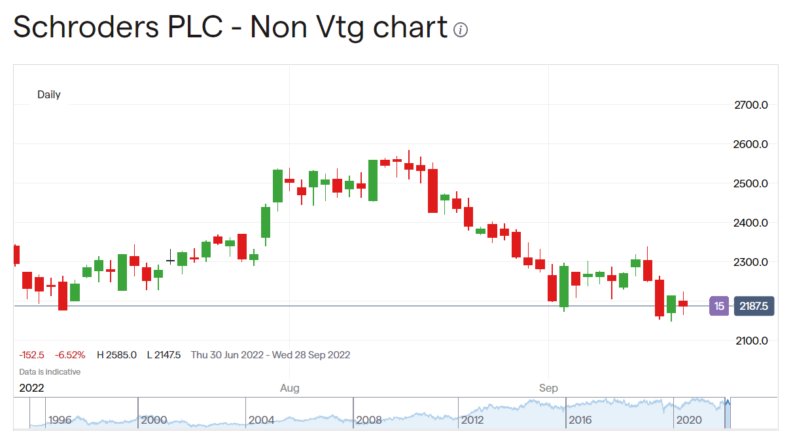Key points:
- Schroders looks like it's down 82% and change
- kThis is actually a share split plus a bonus issue
- Non-voting stock is now enfranchised, previously voting stock was compensated
Schroders (LON: SDR) is listed by some tickers as being down 82.75%. This is not wholly and exactly true and there's a certain amount of “Don't Panic!” that it's necessary to point out here. This is actually a change in the denomination of Schroders shares, not an actual price fall wiping out four fifths of any valuation. We should go further than this though. For certain of the automated recommendation engines – we can see at least one ourselves doing this – will be taking this price fall as a signal to dump Schroders stock for whatever can be got for it. That's not, in fact, the correct response. We have had investment firms and banks toppling into disaster before now but this here at Schroders isn't that.
It is, in fact, possible to say that Schroders is up 2.8% this morning. That's not wholly accurate either but it gets closer to reality than worries of 82% falls. The problem with varied automated guides to trading being that they're not always adjusted for exceptional occurrences. Like, say, stock splits which is what has happened here. Of course, this all being about an investment firm it's more complex than that. The full reading of what has happened is here. Not wholly and entirely, but as a good starting point, there's been a 5 for 1 stock split. So, the SDR share price should be down by 80%.
That it's a little more complex than this explains the other 2 and 3% change in the price. Effectively, the non-voting shares have been enfranchised, the previous voting shares have been offered a small boost to their holdings in compensation, the Schroders share price is, after all of that, remarkably static. At least it's remarkably static in real terms as compared to that 82.something percent fall shown by the ticker.
Also Read: The Best Financial Stocks To Buy Right Now

The simplest explanation is that there's been a five for one share split here at Schroders. That's not sufficient to explain all of the change though. There's also been that bonus issue to the previously voting shares – for all the non-voting shares now become voting, so the holders of the previously voting should be compensated. That's a 3 for 17 issue. The end effect of this is slightly more equity in issue but now only one class of that equity.
The price is down because of more equity in issue of course – there're more pieces of paper making up the ownership of the entire company. There's also that redenomination where 1 piece of paper are now 5. That second part explains the 80% drop, the other couple of percent is, around and about, that issuance of more equity to compensate the previously exclusive voting shareholders.
As to why this has been done. London has long frowned, at least slightly, on dual classes of shares. The idea has been that if you're a shareholder then you own a piece of the company – and so should have a vote. There have been some few companies that have a perhaps more American structure, with voting and non-voting stock. Schroders was one of them and now is not. The market itself, the LSE, has been trying to gently nudge companies with dual voting rights into having the one class of common equity – this is just part of that movement.




